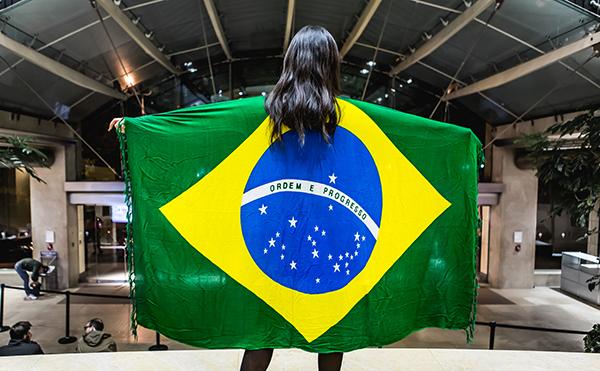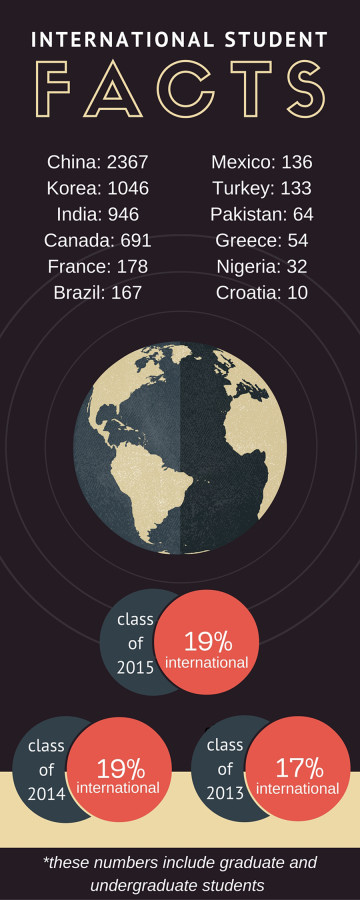The International Issue
October 19, 2015
This week WSN explores the experiences of international students at NYU.

Visas, Testing and Culture Shock: The International Experience
Touted as a global network university, NYU prides itself on its international presence. The university has campuses all over the world available to both NYU and non-NYU students. While domestic students and international students seamlessly blend together on campus, the latter must take a slightly more complicated path.
NYU spokesperson John Beckman said NYU’s international popularity is strong, despite the challenges applicants from abroad face, because of the university’s location.
“Our campuses in Shanghai and Abu Dhabi are very diverse geographically — more so even than our New York campus,” Beckman said. “But New York City is arguably the most international of cities, and that makes our campus here appealing to international students and families.”
Getting to the city, however, requires taking extra steps beyond filling out the Common App. In addition to applying for a visa, many students must pay additional Student and Exchange Visitor Program Fees, along with taking English proficiency exams.
NYU requires that international students whose high schools did not teach in English take a proficiency test, often the Test of English as a Foreign Language. According to NYU’s admissions website, if a student is “not deemed to be of a sufficiently high level to register for academic study,” then they must take extra non-credit English classes.
LS sophomore Julia Abreu, from Sao Paulo, Brazil, described the struggles of being an international student attending school in the United States.
“As an international student, we have extra steps to show that we speak the English language fluently, that we can pay for college, we need to apply for student visas and we seldom get financial aid,” Abreu said. “Sometimes I do feel like I miss home more because not only is it further for me to go visit, but also more expensive.”
Tuition for domestic and international students is the same, yet additional expenses for international students can arise from exchange rates and higher travel costs. Although international students are ineligible for federal financial packages, they can receive institutional aid from the university. As with domestic students, they can only apply for financial aid in their freshman year.
Beyond logistical difficulties, students who live abroad and want to attend a U.S. university often must fulfill the academic requirements of both countries. CAS sophomore Shiqin Cao, who went to the French School of Shanghai and has lived in France and China, said her final year of high school was particularly difficult because she had to balance both French and American standardized tests.“It was definitely harder for us international students because we have to learn about the SAT format testing through a third-party entity,” Cao said. “We have our own exams to take at the same time, in my case it was the French baccalaureate.”
Some students, however, attend schools whose curricula is based on U.S. formats. Steinhardt sophomore Julius Utama grew up in Jakarta, Indonesia, and said the transition to NYU was less difficult for him because he went a U.S. Embassy school.
“I did both the AP and IB curriculum, and so applying through the Common App wasn’t much of a challenge,” Utama said. “I also speak fluent English, which I think definitely made the process easier.”
International students often find that they must adjust to a different academic environments. For Stern sophomore Jennifer Barba, who is from Guadalajara, Mexico, the application process for colleges in the United States was much more involved than for colleges in her home country.
“The process of applying to universities in Mexico is much different than the United States because it’s a lot less intense and competitive,” Barba said.
These factors all create a tangled web of requirements, forms and work — yet Beckman said that year after year NYU’s international student population has grown to record sizes, with 19 percent of this year’s freshman class coming from abroad. According to NYU’s website, over 11,500 international students were enrolled in 2014, compared to under 5,000 in 2000.
The growing numbers are undoubtedly connected to the unique opportunities that stem from attending NYU and living in New York. Abreu said NYU has opened access to many resources she wouldn’t have in Brazil.
“NYU offers more opportunities to branch out academically and to find interesting work,” Abreu said. “There is just more involvement in American universities and much better opportunities.”
But even with the opportunities that NYU has to offer, students are affected by the cultural shift of coming to a new country. Utama said NYU and New York City in general have both played a large role in creating a cultural identity for himself — a sentiment he feels many international students can relate to.
“I had to reflect on many things that involved my own home culture, and whether or not I can forfeit part of it — be it values, traditions, habits, mannerisms, sayings — to adopt an American culture,” Utama said. “While I think that every student experiences this while in college, it is definitely more salient for international students.”
International clubs at NYU
South Slavic Club
By Maddie Pazzani
New York City’s diversity is a crucial part of connecting to home for the international students in the South Slavic Club, whose 15 core members have heritage tracing to Croatia, Serbia, Slovenia, Macedonia and Albania.
Vice President and CAS senior Anthony Filipovic was one of the group’s founding members. Though he knew other students from his home country of Croatia, he said he wanted to create a community where people from Slavic countries, especially those who did not know any other Slavs, could feel at home.
“My Croatian friends and I wanted to create a space for students that come from a similar background, that share the desire of bringing a little bit of their home culture with them to NYU,” Filipovic said.
The organization holds events like movie screenings, brunches and guest lectures with a connection to the club, including one about Hegel by a Slovenian researcher, to keep in touch with their heritage. Members of the group can also make trips to Euro Market in Astoria, Queens, and the restaurant Balkanika in Hell’s Kitchen, to get their fill of food from home.
“Obviously New York — Queens even more so — is an extremely diverse place,” Filipovic said. “There are known locales in Queens where I can find products from my home country, so I may not feel as homesick as if these resources were
not available.”
Chinese Mei Society
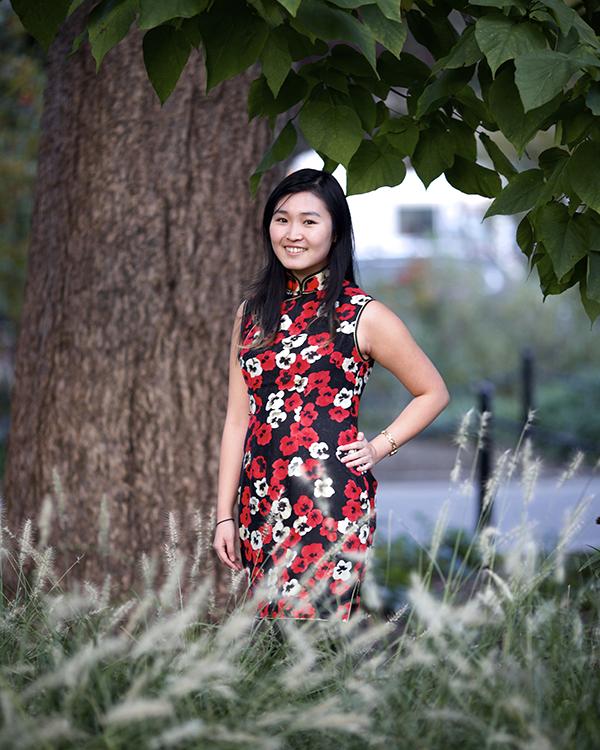
Emily Liu, a member of the Chinese Mei Society, is pictured wearing a traditional Chinese dress.
By Emily Bell
As Halloween approaches, the Chinese Mei Society is getting into the holiday’s spirit with CMS Presents: Spooky Foods. The event lets students try traditional Chinese foods that might seem strange to American sensibilities, from chicken feet to fried grasshoppers.
CMS is best known for its food events, but when CMS was founded in 1988, it was an a cappella group. While there’s no singing in CMS today, the organization hosts multiple events throughout the year designed to build community and spread Chinese culture, said president and Stern senior Michael Dong.
“Mei in Chinese refers to a plum blossom,” Dong said. “That’s an ideology that we still embody. Like the plum blossom, Chinese culture we hope will continue to bloom.”
Members are a mix of international students from China, Chinese-Americans and students interested in Chinese culture. Co-president and Stern senior Jennifer Ho said even though CMS is labeled as a cultural club, they want to expand the community as much as possible, regardless of ethnicity.
CMS is also known for its annual spring charity event, Yuan. Each year, the money raised goes to charities like the China Care Foundation. The event features a fashion show and performers. CMS senior advisor and Steinhardt senior Emily Liu said Yuan is her favorite CMS event.
“I actually got to emcee for Yuan last semester and I think it was just a really fun experience getting the crowd riled up and everything and just watching all the performances and people just being very happy, makes me happy,” Liu said.
Pakistani Student Association
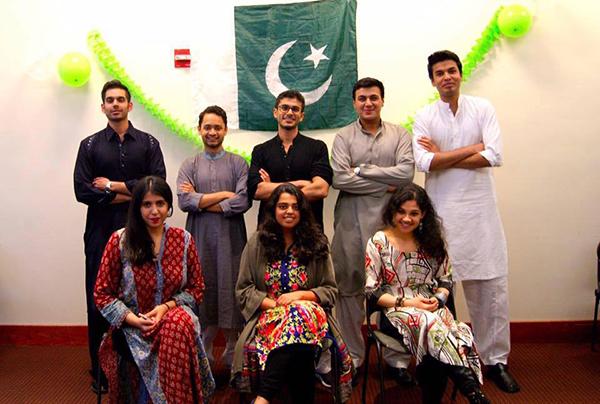
NYU Pakistani Club 2015-2016 executive board.
By Bryna Shuman
The Pakistani Student Association is one of the largest organizations on campus, with approximately 1,000 student members. While some members are international students from Pakistan and others are those with a Pakistani heritage, they all share the common goal of supporting and promoting awareness of Pakistani culture at NYU.
LS sophomore and PSA IT director Resham Elahi said the best part of the PSA is its accessibility for Pakistani students.
“For a lot of the international members, the PSA is a home away from home,” Elahi said. “For others, it’s a way to connect to their roots in a way they haven’t been able to do so before.”
The PSA tries to hold at least one event for members per month. One of the most popular events is the annual Spring Hungama, or “celebration.” In conjunction with the Columbia University PSA, NYU PSA members choose a groom while Columbia members vote on a bride to participate in a traditional, though fake, Pakistani wedding.
The PSA e-board is also working on planning new events for PSA members to enjoy this year, including inter-school cricket matches with Columbia and an event with NYU’s Indian Cultural Exchange where members can discuss similarities and differences between the two cultures.
Turkish Student Association
By Kavish Harjai
The Turkish Student Association at NYU tries to advance its main goals no matter the type of events it holds, said vice president and CAS junior Suheyla Cavdar.
“Our main goals and missions are to promote the Turkish culture, provide a supportive community for Turkish students at NYU, and build bridges of understanding between cultures,” Cavdar said.
The club strives to be open to everyone, welcoming not only Turkish and Turkish-American students, but also non-Turks and lovers of Turkish culture. To maintain its mission, the club hosts various social and networking events.
The Turkish Student Association collaborates with other clubs whose cultures sometimes overlap.
“We celebrated Nowruz with the Afghan Students Association and Pakistani Students Association,” Cavdar said. “We also took part in the Asian Heritage Month’s Spring Festival.”
At the group’s social events, attendees are greeted with Turkish drinks and food that help enrich their cultural experience. The Turkish Student Association tries to support students who are originally from Turkey, giving them an open forum where they can discuss problems they are facing and how to overcome them.
Other than social events, the club hosts opportunities for students to network with Turkish professionals. During the 2015 spring semester, the organization hosted an event with accomplished Turkish-Americans such as NYU professor Selcuk Sirin, Huffington Post journalist Arzu Kaya Uranli, attorney Zafer Akin and environmentalist and entrepreneur Leyla Acaroglu.
The next networking event will take place in March and will include experts on Turkey and Turkish politics, specifically those who focus on women’s issues.
African Students Union
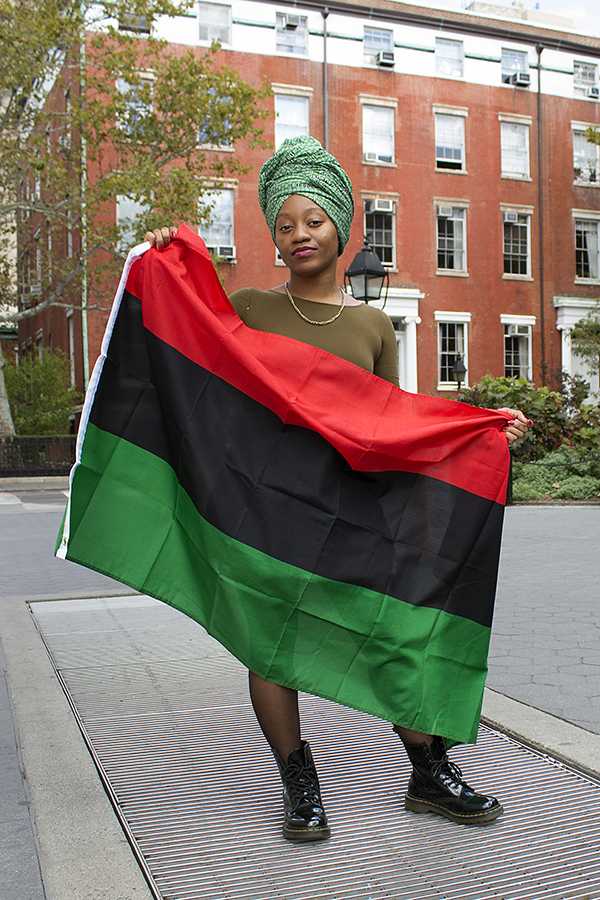
Chioma Nwana, president of NYU’s African Students Union, is wearing a traditional Nigerian headscarf and
holding the Pan-African flag.
By Maddie Pazzani
Members of the African Students Union come from countries like Nigeria, United Arab Emirates, Ghana, Ethiopia, South Africa, Botswana, Rwanda and the United States. However, CAS sophomore and ASU president Chioma Nwama said there are nevertheless common bonds between them that create a solid community.
“The shared culture acts as a platform for members of the NYU community to relate to each other on a level that they may not normally be able to relate to their classmates or their roommates,” Nwana said. “It’s always nice to have people that understand you.”
About once a month, the group hosts fashion shows, cultural nights, charity events or pre-professional mixers. Last fall during the Ebola crisis, the group hosted a Kick Out Ebola fundraiser to help areas affected by the outbreak.
When discussions turn to African economics, stereotypes or cultural appropriation, Nwana said the group’s mix of international and American students provides for a range of perspectives, adding that living in New York City provides an environment where she can express her culture comfortably.
“It seems that people here are much more vocal about their heritage and less hesitant to share it with others, which allows me to feel the same way about mine,” Nwama said.
Brazilian Society
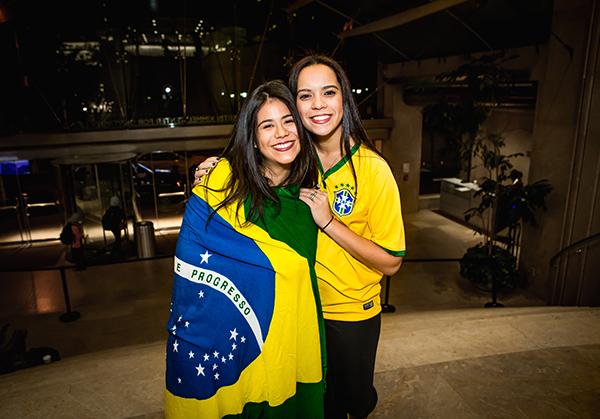
Co-Presidents of the NYU Brazilian Society, Isabela Fonseca and Steph
anie Queiroz,showcase their national spirit.
By Emily Bell
When CAS senior Stephanie Queiroz came to NYU, the Brazilian Society at NYU’s table at Club Fest caught her eye. After finding out the society was inactive the next semester, she and six others decided to reinvigorate the club to help foster a Brazilian community at NYU.
“We were like okay, well this is our time to take initiative and bring it back, so that’s what we did,” Queiroz, now co-president, said.
The students formed a board, have been growing the society and planning events ever since. Queiroz currently leads the society with co-president and CAS senior Isabela Fonseca. Recently, they held a conference on the Brazilian entertainment and media industries on Oct. 10. Queiroz said about 150 people attended, including individuals not affiliated with NYU.
In addition to the conference and a panel discussion with Carlos Trostli and Claudio Silva last March, which Queiroz said were efforts to diversify the types of events they held, the society holds a range of events including viewing parties to support Brazilian soccer, dinners and general meetings.
Queiroz said the majority of members of the society are international students from Brazil, though there are Brazilian-Americans and a few people with no connection to Brazil. Although some native Brazilians know each other from home, Queiroz said the society is a place to meet new people and to enjoy aspects of Brazilian culture.
“I’m so glad that I found these people and found other people that were also interested in bringing back this community at school and on campus and to share it with other people because I think it’s important,” Queiroz said. “I would love for other people to be able to experience or catch glimpses of what we’re about and what our culture is.”
Hellenic Heritage Association
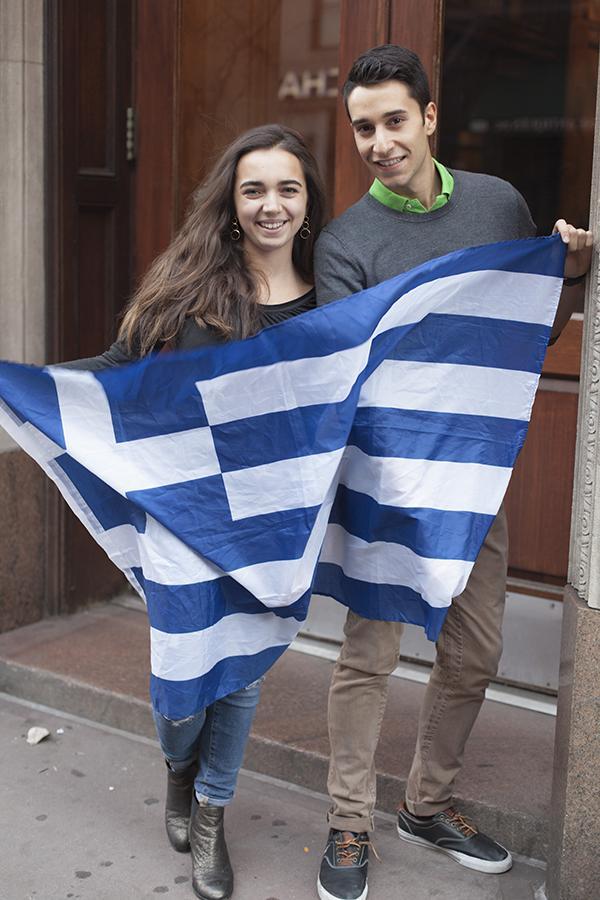
Marita Vlachou and George Maniadis co-presidents of the NYU Hellenic Heritage Society.
By Jonathan Keshishoglou
While the term “Greek Life” often refers to fraternities or sororities, there are entities on campus that bring together students with ties to Greece’s history and culture. The NYU Hellenic Heritage Association is the focal point of these efforts.
While the HHA is open to all students, it mostly draws Greeks and Greek-Americans. Tisch junior Eugenia Efstathiou said while Greek and Greek-American students comprise the bulk of the club’s membership, the HHA still attracts other students who want to learn more about Greek culture.
“We have had members that have no relation to Greece but enjoy Greek food or have been to Greece and have enjoyed the country’s culture,” Efstathiou said.
On the verge of its 35th anniversary, the HHA’s goals are to bring students together through a Greek presence on campus and take advantage of New York’s broader Greek side. They frequently host events, from food and film events to fundraisers for the Hellenic Relief Foundation, which provides support to those in the Greek economic crisis. Beyond this, they hold meetings every two weeks.
For Tisch senior George Maniadis, HHA co-president and native of Thessaloniki, Greece, the HHA was a connection to back home.
“I can be in touch with Greek culture and activities that I could not get in touch with in the United States, if not for the Greek club,” Maniadis said.

